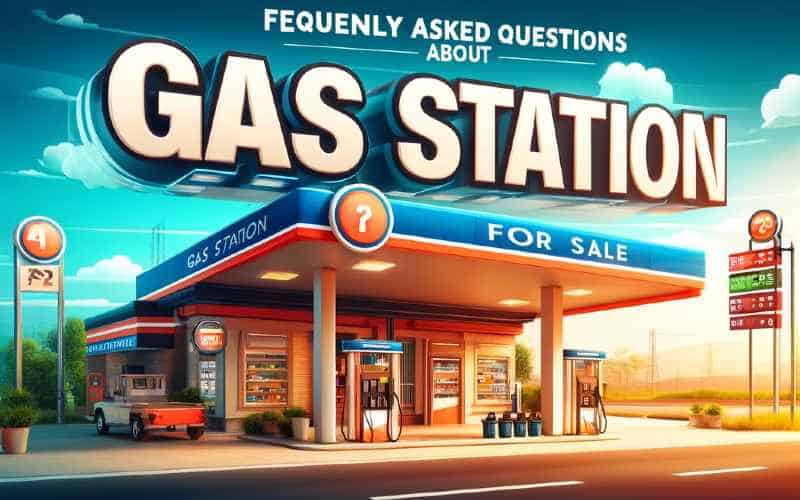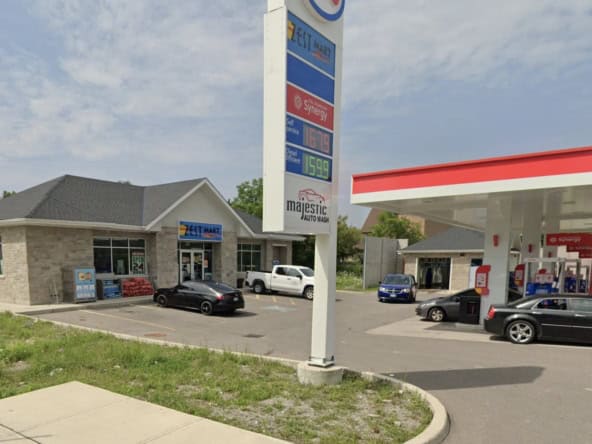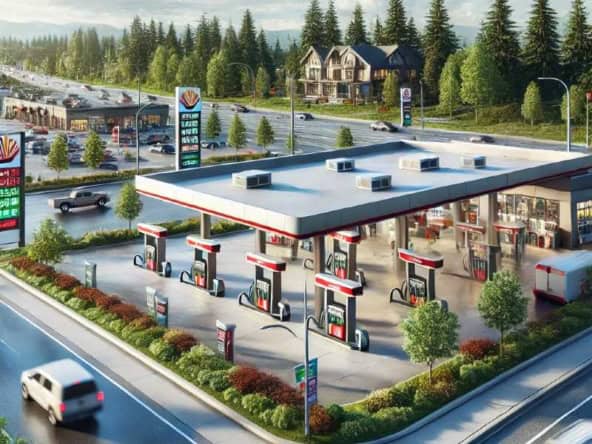If you’re considering purchasing a gas station for sale, you likely have many questions. Buying a gas station can be a profitable and stable business investment. Here, we’ve compiled 15 of the most frequently asked questions about gas station businesses for sale, providing detailed answers to help you make an informed decision.
1. What Should I Look for When Buying a Gas Station for Sale?
When looking at a gas station for sale, consider:
- Location: High traffic areas are ideal because they attract more customers. Locations near highways, busy intersections, or in densely populated areas can significantly boost sales. Consider the demographics and development plans of the area.
- Traffic volume: More traffic usually means more sales. Analyze traffic patterns and consider both vehicle and foot traffic. Traffic counts can often be obtained from local government websites.
- Nearby competition: Evaluate other gas stations in the vicinity. Too many competitors can reduce your market share, but the absence of competitors might indicate lower demand.
- Fuel supplier contracts: Understand the terms and conditions of existing contracts, including pricing, delivery schedules, and branding requirements. Negotiating favorable terms can significantly impact your profitability.
- Financial performance: Review past financial statements to assess profitability. Look for consistent revenue, healthy profit margins, and manageable expenses. Pay attention to trends in sales and operating costs.
- Environmental regulations: Ensure compliance with local laws regarding fuel storage, leak detection, and spill response. Non-compliance can lead to hefty fines and cleanup costs.
- Additional revenue streams: Consider opportunities like convenience stores or car washes, which can provide significant additional income. Look for ways to add value to the property.
For detailed listings and more information, visit our Gas Stations for Sale page.
2. How Can I Finance the Purchase of a Gas Station for Sale?
Financing options for a gas station for sale include:
- Traditional bank loans: Common but may require a substantial down payment and have stringent approval criteria. Ensure you have a strong business plan and good credit history.
- SBA (Small Business Administration) loans: Often have favorable terms for small business owners, including lower down payments and longer repayment periods. The SBA 7(a) loan program is particularly popular for gas station purchases.
- Seller financing: The seller finances part of the purchase price, making it easier to obtain funding. This can be a good option if you have difficulty securing traditional financing.
- Private investors: Seek investment from individuals or groups interested in the gas station business. This can provide the necessary capital without the strict requirements of banks.
For financing advice and options, explore our resources at Nav Sidhu.
3. What Are the Main Expenses Involved in Running a Gas Station?
Key expenses when running a gas station business include:
- Fuel costs: The largest ongoing expense, heavily influenced by market prices and supplier contracts. It’s essential to manage fuel inventory efficiently to minimize costs.
- Employee wages: Competitive salaries to retain good staff, as employee turnover can be costly and disruptive.
- Utilities: Electricity, water, and other services are necessary for daily operations. Energy-efficient practices can help reduce these costs.
- Maintenance: Regular upkeep of the property and equipment, including fuel pumps, storage tanks, and convenience store facilities. Preventive maintenance can avoid costly repairs and downtime.
- Insurance: Coverage for liability, property damage, and environmental risks is crucial to protect your investment.
- Inventory: Stock for convenience stores or additional services like car washes. Managing inventory effectively ensures you have the right products to meet customer demand without overstocking.
For more on managing expenses, check out our Running a Gas Station guide.
4. Are There Environmental Concerns Associated with Owning a Gas Station?
Yes, consider these environmental concerns when buying a gas station property for sale:
- Environmental regulations: Compliance is mandatory to prevent soil and groundwater contamination. Regulations vary by location, so familiarize yourself with local requirements.
- Regular inspections: Conduct frequent checks to ensure safety and compliance. Regular inspections can help identify and address issues before they become significant problems.
- Tank maintenance: Proper maintenance to prevent leaks. Underground storage tanks must be inspected and maintained regularly to avoid leaks and contamination.
- Cleanup procedures: Have plans in place for potential environmental issues. This includes spill response plans and having the necessary equipment on hand to deal with leaks or spills.
For compliance tips, visit our Environmental Concerns page.
5. How Do I Determine the Profitability of a Gas Station for Sale?
To determine the profitability of a gas station for sale, evaluate:
- Financial statements: Analyze income, expenses, and cash flow. Look at the balance sheet, income statement, and cash flow statement for a comprehensive understanding of financial health.
- Fuel sales: Primary revenue source. Evaluate the volume of fuel sold and the margins earned on each gallon.
- Convenience store revenue: Secondary income. Analyze sales from non-fuel items, including snacks, beverages, and other retail products.
- Car wash earnings: Additional revenue stream. If the gas station has a car wash, assess its profitability and potential for growth.
- Trends: Look for consistent growth or decline. Positive trends indicate a healthy business, while negative trends may require further investigation.
- Industry benchmarks: Compare with other gas stations. Understanding industry standards can help you gauge the station’s performance relative to its peers.
For detailed evaluation methods, visit our Profitability Guide.
6. What Licenses and Permits Are Required to Operate a Gas Station?
Typically required licenses and permits for a gas station business for sale include:
- Business license: Standard for operating any business. This is usually obtained from the local government.
- Environmental permits: For handling and storing fuel. These permits ensure you comply with environmental regulations.
- Fuel dispenser permits: Ensuring proper operation of pumps. These permits are necessary for operating fuel dispensing equipment.
- Health permits: For any food or convenience store items. If you sell food or beverages, health permits ensure you comply with food safety regulations.
For more on permits and licenses, visit our Licensing Guide.
7. How Can I Increase the Revenue of My Gas Station?
To increase the revenue of a gas station for sale, consider these strategies:
- Expanding services: Add car washes, food services, or other amenities. Diversifying services can attract more customers and increase sales.
- Improving customer service: Friendly and efficient staff can enhance the customer experience, encouraging repeat business.
- Offering promotions: Discounts, loyalty programs, and special offers can attract new customers and retain existing ones.
- Optimizing inventory: Stock popular and profitable items. Regularly review sales data to ensure you carry products that meet customer demand.
- Competitive fuel prices: Attract more customers by offering competitive fuel prices. Use price promotions strategically to increase traffic and sales.
For more strategies, check out our Revenue Increase Tips.
8. What Are the Risks of Owning a Gas Station Business?
Potential risks when owning a gas station business for sale include:
- Fluctuating fuel prices: Can affect profit margins. It’s essential to manage fuel inventory effectively and consider hedging strategies to mitigate this risk.
- Environmental liabilities: Costly cleanups if regulations aren’t met. Non-compliance can lead to significant fines and cleanup costs.
- Regulatory compliance: Adhering to laws and regulations. Stay informed about changing regulations to ensure ongoing compliance.
- Competition: Other gas stations in the area can impact market share. Differentiate your services to stay competitive.
- Changes in consumer behavior: Shifts in fuel demand or purchasing habits. Stay informed about industry trends and adapt to changing consumer preferences.
For risk management strategies, visit our Risk Management Guide.
9. How Do I Choose the Right Location for a Gas Station for Sale?
Consider these factors when choosing a location for a gas station for sale:
- Traffic volume: More traffic can mean more customers. Analyze traffic patterns and choose a location with high vehicle counts.
- Visibility: Easy to see from the road. A highly visible location can attract more customers.
- Accessibility: Easy to enter and exit the station. Ensure the location is convenient for customers to access.
- Nearby businesses: Complementary businesses can increase footfall. Locations near popular retail stores or restaurants can drive more traffic to your station.
- Residential areas: Proximity to homes can drive consistent traffic. Gas stations near residential areas can benefit from regular, repeat customers.
For more on choosing a location, visit our Location Guide.
10. What Are the Benefits of Buying an Established Gas Station Versus Building a New One?
Buying an established gas station for sale offers:
- Existing customer base: Immediate revenue. You start with a built-in customer base, which can provide immediate cash flow.
- Established supplier relationships: Easier management. Existing relationships with suppliers can simplify operations.
- Immediate cash flow: Start earning from day one. An established business provides an immediate income stream.
Building a new gas station allows for:
- Customization: Tailor the station to your specifications. You can design the station to meet your specific needs and preferences.
- Potentially lower initial costs: Depending on land and construction costs. In some cases, building a new station may be more cost-effective than buying an existing one.
- Modern facilities: Brand new infrastructure. New construction can offer the latest technology and design features.
For more details, visit our Building vs. Buying Guide.
11. How Important Is Branding for a Gas Station?
Branding impacts:
- Customer loyalty: Trusted brands attract repeat business. A strong brand can build customer trust and encourage repeat visits.
- Trust and reliability: Known brands can command higher prices. Customers may be willing to pay more for fuel and services from a trusted brand.
- Differentiation: Stand out from competitors. Effective branding can help you differentiate your station from others in the area.
For more information on branding, visit our Branding Guide.
12. What Should I Know About Fuel Supplier Contracts?
Understand these aspects of fuel supplier contracts when considering a gas station property for sale:
- Pricing terms: Understand how prices are determined. Fuel prices can significantly impact profitability, so it’s essential to understand the pricing structure.
- Delivery schedules: Ensure reliable supply. Regular and timely fuel deliveries are crucial for maintaining operations.
- Branding requirements: Adhere to brand standards. Supplier contracts may include requirements for branding and marketing materials.
- Contract length: Know the duration and terms of renewal. Understand the length of the contract and the terms for extending it.
For detailed information on contracts, visit our Fuel Supplier Contracts Guide.
13. Can I Add a Convenience Store or Car Wash to My Gas Station?
Yes, adding a convenience store or car wash to a gas station business for sale can enhance your revenue. Benefits include:
- Increased revenue: Additional services attract more customers. Convenience stores offer a range of products, from snacks to household items, increasing the average transaction value.
- Customer convenience: One-stop-shop for various needs. Customers appreciate the ability to fuel up, grab a snack, and get their car washed all in one location.
- Diversified income: Less reliance on fuel sales alone. Additional services provide multiple revenue streams, which can stabilize your income.
For more information on expanding services, visit our Adding Services Guide.
14. What Trends Are Affecting the Gas Station Industry?
Key trends affecting gas station businesses for sale include:
- Environmental regulations: Stricter laws on fuel storage and sales. Staying compliant is crucial to avoid fines and protect the environment.
- Technological advancements: Modern fuel dispensers and payment systems. Adopting new technology can improve efficiency and customer satisfaction.
- Consumer preferences: Shifts towards more services and amenities. Consumers increasingly prefer gas stations that offer convenience stores, car washes, and quick food options.
For more on industry trends, visit our Industry Trends Guide.
15. How Do I Value a Gas Station for Sale?
To value a gas station for sale, consider:
- Financial performance: Income, expenses, and profit margins. Review historical financial data to assess profitability.
- Location: Prime locations fetch higher prices. Consider traffic volume, visibility, and accessibility.
- Assets: Value of equipment and infrastructure. Ensure all assets are in good condition and up-to-date.
- Market conditions: Supply and demand in the area. Market trends can impact the value of your gas station.
- Growth potential: Opportunities for increasing revenue. Look for ways to enhance services and attract more customers.
For a detailed valuation, visit our Valuation Guide.
16. What Is TSSA and Why Is It Important for Gas Station Owners?
The Technical Standards and Safety Authority (TSSA) is an organization that oversees the safety standards for various industries in Ontario, including gas stations. Compliance with TSSA regulations is crucial to ensure the safe operation of your gas station and to avoid fines and shutdowns.
TSSA is responsible for:
- Inspections: Regular inspections to ensure compliance with safety standards.
- Licensing: Issuing licenses for fuel storage and dispensing.
- Training: Providing training and certification for gas station operators.
For more information, visit the TSSA website.
For more on TSSA compliance, visit our TSSA Guide.
Additional Resources
For further reading and resources, visit the blogs for gas stations.
click here to see our Listings






